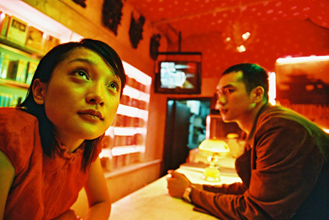Lian Ai Zhong De Bao Bei
Li Shaohong
China 2003

|
" CinemaxX 3 12.02. 12.45 |
Produktion + Weltvertrieb:
Beijing Rosat Film & TV Production Co., Ltd.
2603, Block B, Eagie Plaza, No. 26,
Xiaoyun Road, Chaoyang District,
Beijing, China 100016
Tel.: (86-10) 8458 4601, Fax: 8458 3293
E-mail: goodfilm@ms74.hinet.net
Buch: Zheng Zhong, Wang Yao
Kamera: Zeng Nianping
Ton: Wu Jiang
Darsteller: Zhou Xun, Huang Jue, Chen Kun
Format: 35mm, 1:1.85, Farbe
Länge: 100 Minuten, 24 Bilder/Sek.
Sprache: Chinesisch (Mandarin)
Liu is bored with modern, materialistic life. His only relief is to confess his uneasiness to his video camera. He dreams that one day, he will discover passionate love. His dream comes true when Baober finds Liu's lost video tape. Baober is a young and romantic girl, living in fast-moving China, bearing with the traumas of change but hoping for a passionate future. Very soon, Liu and Baober fall in love and decide to live together in an empty factory. Sharing life together quickly reveals their differences. This situation brings back the memory of traumas Baober suffered when she was a little girl. She panics and disappears from Liu's life. Liu then spends all his energy finding and understanding Baober. As he starts to enter Baober's unique spiritual world, he realises that he has lost her forever. Li Shaohong: "Why did I make this film? This is a chance meeting with the soul, a love feast. It’s a film that reflects the pressures that the Chinese people face during these changing times... Baober is the lost soul in this love affair. Even her birth is a joke. The ancient city where she was born has, in 20 years, gone through a transformation that should have taken 200 years to achieve. The bulldozers reduced the tumultuous history of the capital to rubble, and a new city emerged while Baober was growing up. This massive cultural earthquake shattered her spiritual world. As we passionately embrace this modern life, what has become of our souls? How do we bear the pressures that modernisation has brought on our spirits? We rush forward into these modern times, with no time to reflect on the state of our minds. Like Baober, our spirits have been abandoned on the streets.
Li Shaohong, geb. 1955 in Suzhu in der Nähe von Shanghai. Von 1978 bis 1982 Regie-Studium an der Filmakademie in Beijing. Filme seit 1988, im Forum: Xue se qing chen (Bloody Morning, 1990), Sishi buhuo (Family Portrait, 1992).